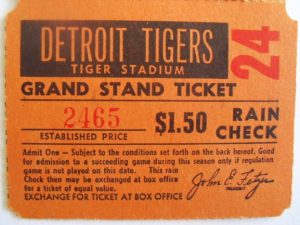A conversation among colleagues at lunch:
Dave, are you coming with us to the new gallery after work today?
Oh no! I forgot about that, Abby. I’ll have to take a rain check.
Could we go next week instead?
Well, today’s the opening, so Tom and I will go anyway. But we’ll tell you if it’s worth it!
In this context, to take a rain check means so much as „etwas auf ein andermal verschieben“, it’s just a much more idiomatic way of explaining it than the German equivalent!
This is a rain check:
It used to be sold to spectators at a baseball game when rain or other bad weather stopped play completely, and allowed them to return on another night and watch another game. You might be surprised that the whole game was stopped because of a little rain, because soccer players and other athletes play in some pretty extreme weather.
However, in baseball, the condition of the sandy diamond is very important for play. If it becomes too wet, players running could slip and injure themselves. Therefore, the risk of stopped play becomes very high when the weather is bad. Rain checks became popular in the beginning of the 20th century, mostly because they prevented stadium operators from losing income generated by ticket and food or drink sales during extended periods of bad weather.
Nowadays, we use the phrase to take a rain check to postpone any plans that we’ve made but can’t attend.
Also, don’t be surprised if you see more posts about idioms that have their roots in baseball over the next several weeks. April is the traditional beginning of the baseball season and the sport has given speakers of American English many idioms that are often used in a business setting.





 This common British idiom comes from the longer phrase: „What you lose on the swings you gain on the roundabouts“ and is based on a poem by Irish writer Patrick Reginald Chalmers. It conjures the image of two fairground rides – the roundabout (similar to a carousel) and the swing. Both move without any actual change in location, they return to where they started. This image now stands for losses balanced by gains.
This common British idiom comes from the longer phrase: „What you lose on the swings you gain on the roundabouts“ and is based on a poem by Irish writer Patrick Reginald Chalmers. It conjures the image of two fairground rides – the roundabout (similar to a carousel) and the swing. Both move without any actual change in location, they return to where they started. This image now stands for losses balanced by gains. After our post on
After our post on